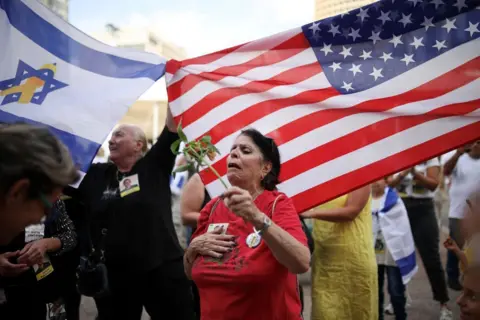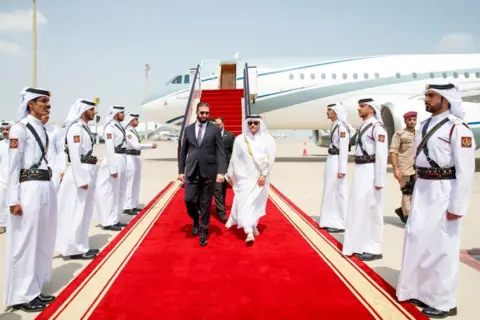How Trump secured a Gaza breakthrough which eluded Biden

At the time, Israel's air strike against the Hamas negotiating team in Qatar seemed like yet another escalation that pushed the prospect of peace further away.
The attack on 9 September violated the sovereignty of an American ally and risked expanding the conflict into a region-wide war.
Diplomacy appeared to be in ruins.
Instead it turned out to be a key moment that has led to a deal, announced by President Donald Trump, to release all remaining hostages.
This is a goal that he, and President Joe Biden before him, had sought for nearly two years.
It is just the first step towards a more durable peace, and the details of Hamas disarmament, Gaza governance and full Israeli withdrawal remain to be negotiated.
But if this agreement holds, it could be Trump's signature achievement of his second term - one that eluded Biden and his diplomatic team.
Trump's unique style and crucial relationships with Israel and the Arab world appear to have contributed to this breakthrough.
But, as with most diplomatic achievements, there were also factors at play beyond control of either man.
In public, Trump and Israeli Prime Minister Benjamin Netanyahu are all smiles.
Trump likes to say that Israel has no better friend, and Netanyahu has described Trump as Israel's "greatest ever ally in the White House". And these warm words have been matched by actions.
During his first presidential term, Trump moved the US embassy in Israel from Tel Aviv to Jerusalem and abandoned a long-held US position that Israeli settlements in the Palestinian West Bank are illegal, the position under international law.
When Israel began its air strikes against Iran in June, Trump ordered US bombers to target the nation's nuclear enrichment facilities with its most powerful conventional bombs.

Those public demonstrations of support may have given Trump the room to exert more pressure on Israel behind the scenes. According to reports, Trump's negotiator, Steve Witkoff, browbeat Netanyahu in late 2024 into accepting a temporary ceasefire in exchange for the release of some hostages.
When Israel launched strikes against Syrian forces in July, including bombing a Christian church, Trump pressured Netanyahu to change course.
Trump exhibited a degree of will and pressure on an Israeli prime minister that is virtually unprecedented, says Aaron David Miller of the Carnegie Endowment for International Peace. "There is no example of an American president literally telling an Israeli prime minister that you're going to have to comply or else."
Biden's relationship with Netanyahu's government was always more tenuous.
His administration's "bear hug" strategy held that the US had to embrace Israel publicly in order to allow it to moderate the nation's war conduct in private.
Underneath this was Biden's nearly half-century of support for Israel, as well as sharp divisions within his Democratic coalition over the Gaza War. Every step Biden took risked fracturing his own domestic support, whereas Trump's solid Republican base gave him more room to manoeuvre.
In the end, domestic politics or personal relationships may have had less importance than the simple fact that, during Biden's presidency, Israel was not ready to make peace.
Eight months into Trump's second term, with Iran chastened, Hezbollah to its immediate north greatly diminished and Gaza in ruins, all its major strategy objectives had been accomplished.
The Israeli missile attack in Doha, which killed a Qatari citizen but no Hamas officials, prompted Trump to issue an ultimatum to Netanyahu. The war had to stop.
Trump had given Israel a relatively free hand in Gaza. He lent American military might to Israel's campaign in Iran. But an attack on Qatar soil was a different matter entirely, moving him towards the Arab position on how best to end the war.
Several Trump officials have told the BBC's US partner CBS this was a turning point which galvanised the president to exert maximum pressure to get a peace deal done.

This US president's close ties with the Gulf states are well documented. He has business dealings with Qatar and the UAE. He began both his presidential terms with state visits to Saudi Arabia. This year, he also stopped in Doha and Abu Dhabi.
His Abraham Accords, which normalised relations between Israel and several Muslim states, including the UAE, was the biggest diplomatic achievement of his first term.
The time he spent in the capitals of the Arabian Peninsula earlier this year helped change his thinking, says Ed Husain of the Council on Foreign Relations. The US president did not visit Israel on this Middle East trip but visited the UAE, Saudi Arabia and Qatar where he heard repeated calls to bring an end to the war.
Less than a month after that Israeli strike on Doha, Trump sat nearby as Netanyahu personally phoned Qatar to apologise. And later that day, the Israeli leader signed off on Trump's 20-point peace plan for Gaza - one that also had the backing of key Muslim nations in the region.
If Trump's relationship with Netanyahu gave him the room to pressure Israel to strike a deal, his history with Muslim leaders may have secured their support, and helped them convince Hamas to commit to the deal.
"One of the things that clearly happened was that President Trump developed leverage with the Israelis, and indirectly with Hamas," says Jon Alterman of the Center for Strategic and International Studies (CSIS).
"That made a difference. His ability to do this on his timing, and not succumb to the desires of the combatants has been a problem that lot of previous presidents have struggled with, and he seems to do relatively successfully."
The fact that Trump is much more popular in Israel than Netanyahu himself was leverage that he used to his benefit, he adds.
Now Israel has committed to releasing more than 1,000 Palestinians held in Israeli prisons and has agreed to a partial withdrawal from Gaza.
Hamas will release all the remaining hostages, living and dead, taken during the original 7 October Hamas attack, which resulted in the death of more than 1,200 Israelis.
An end to the war, which has resulted in the devastation of Gaza and the deaths of more than 67,000 Palestinians is now imaginable.
The global condemnation of Israel over its actions in Gaza also weighed on Trump's thinking.
Conditions on the ground are unprecedented in terms of destruction and the humanitarian catastrophe for Palestinians. Over recent months the Netanyahu government became increasingly isolated internationally.
As Israel took military control of the food supply to Palestinians and then announced a planned assault on Gaza City, several major Europeans countries, led by French President Emmanuel Macron, decided they couldn't stay aligned with Washington's position of unequivocal support for Israel.

A historic split followed between the Americans and European allies when it came to key elements of diplomacy and the future of the Israeli-Palestinian conflict.
The Trump administration castigated France when it said it would recognise a Palestinian state, a move followed by the UK. They were trying to keep the idea of a two-state solution on life support, but more fundamentally marginalise the extremes on both sides and revive a diplomatic path to a shared Israeli-Palestinian future.
But Macron was astute in getting the Saudis on board for his peace plan.
Ultimately Trump was faced with a European-Arab alliance versus Israeli nationalists and the far right when it came to visions for Gaza's longer term future. He chose his friends in the Gulf.
Under a French-Saudi peace plan, Arab countries also issued an unprecedented condemnation of Hamas' October 7 attacks and called for the group to end its rule on Gaza and hand over its weapons to the Palestinian Authority under independent statehood.
This was a diplomatic win for the Arabs and Europeans. Trump's 20-point plan drew on the France-Saudi plan in key areas, including a reference to eventual Palestinian "statehood" even if this was vague and highly conditional.
Trump, while asking Turkey, Qatar and Egypt to maintain pressure on Hamas, boxed in Netanyahu, putting unprecedented pressure on him to end the war.
No-one could be the side to say no to Trump.
Trump's unorthodox manner still has the capacity to shock. It starts with bluster or bombast but then develops into something more conventional.
In his first term, his "little rocket man" insults and "fire and fury" warnings appeared to be taking the US to the brink of war with North Korea. Instead he engaged in direct talks.
Trump kicked off his second term with an eye-popping suggestion that Palestinians should be required to relocate from Gaza as it was turned into an international oceanfront resort.
Muslim leaders were incensed. Seasoned Middle East diplomats were aghast.
Trump's 20-point peace plan, however, isn't that different from the kind of deal Biden would have struck and that America's allies had long endorsed. A blueprint for a Gaza Riviera it was not.
Trump has taken a very unconventional path to what is a conventional result. It has been messy. It may not be how they teach diplomacy in Ivy League universities. But, at least in this case and at this moment, it has proven effective.
Tomorrow the Nobel Committee will announce this year's Peace Prize winner. And while it is unlikely that Trump will be the recipient, that prospect doesn't seem nearly as unlikely as it did just a few weeks ago.
BBC





